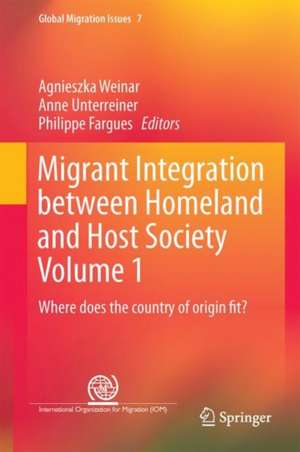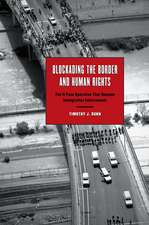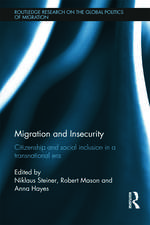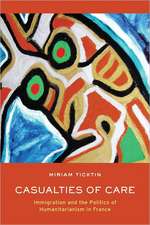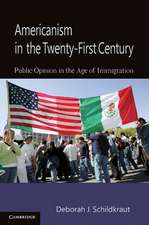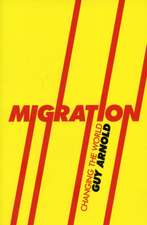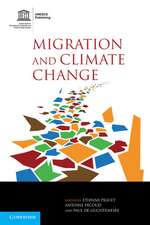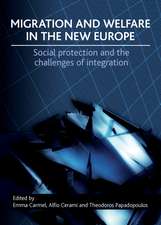Migrant Integration Between Homeland and Host Society Volume 1: Where does the country of origin fit?: Global Migration Issues, cartea 7
Editat de Agnieszka Weinar, Anne Unterreiner, Philippe Farguesen Limba Engleză Hardback – 6 iun 2017
| Toate formatele și edițiile | Preț | Express |
|---|---|---|
| Paperback (1) | 638.76 lei 6-8 săpt. | |
| Springer International Publishing – 9 mai 2018 | 638.76 lei 6-8 săpt. | |
| Hardback (1) | 644.95 lei 6-8 săpt. | |
| Springer International Publishing – 6 iun 2017 | 644.95 lei 6-8 săpt. |
Preț: 644.95 lei
Preț vechi: 758.77 lei
-15% Nou
Puncte Express: 967
Preț estimativ în valută:
123.41€ • 129.54$ • 102.43£
123.41€ • 129.54$ • 102.43£
Carte tipărită la comandă
Livrare economică 11-25 aprilie
Preluare comenzi: 021 569.72.76
Specificații
ISBN-13: 9783319561745
ISBN-10: 331956174X
Pagini: 251
Ilustrații: X, 251 p. 6 illus.
Dimensiuni: 155 x 235 x 16 mm
Greutate: 0.54 kg
Ediția:1st ed. 2017
Editura: Springer International Publishing
Colecția Springer
Seria Global Migration Issues
Locul publicării:Cham, Switzerland
ISBN-10: 331956174X
Pagini: 251
Ilustrații: X, 251 p. 6 illus.
Dimensiuni: 155 x 235 x 16 mm
Greutate: 0.54 kg
Ediția:1st ed. 2017
Editura: Springer International Publishing
Colecția Springer
Seria Global Migration Issues
Locul publicării:Cham, Switzerland
Cuprins
1: Introduction: Integration as a three-way process: Anna Unterreiner, Agnieszka Weinar.- 2: Immigrant assimilation in the labour market: what is missing in economic literature: Alessandra Venturini.- 3: Country of origin effects and impacts on educational attainment of pupils with migrant backgrounds. Towards a new research agenda: Dirk Jacobs and Anne Unterreiner.- 4: Language acquisition and cultural integration: Alexandra Filhon.- 5: Political and civic participation of immigrants in host countries. An interpretative framework from the perspective of the origin countries and societies: Lorenzo Gabrielli, Sonia GSIR, Ricard Zapata-Barrero.- 6: Residential Integration – Towards A Sending Country Perspective: Sona Kalantaryan, Ben Gidley, Maria Luisa Caputo.- 7: Do countries of origin contribute to socio-cultural integration of migrants abroad? Sonia Gsir.- 8: Religion and Diasporas: Challenges of the Emigration countries: Jocelyn Cesari.- 9: Access to Citizenship and the Role of Origin Countries: Maarten Peter Vink, Tijana Prokic-Breuer, Jaap Dronkers.- 10: Governance of integration and the role of the countries of origin – a global perspective: Agnieszka Weinar, Maria Vincenza Desiderio, Cameron Thibos.
Textul de pe ultima copertă
This book provides a theoretical framing to analyse and examine the interaction between origin and destination in the migrant integration process. Coverage offers a set of concrete conceptual tools, which can be operationalised when measuring integration. This title is the first of two complementary volumes, each of which is designed to stand alone and provide a different approach to the topic. Here, the chapters offer a detailed look at integration across eight key areas: labour, education, language and culture, civic and political participation, housing, social ties, religion, and access to citizenship. Readers are presented with an examination into the globally available knowledge on interactions between emigration/diaspora policies on one hand and integration policies on the other. Migrants actively belong to two places: the land they left behind and the home they are seeking to build. This book gives an insightful argument for the need to include information about countries and communities of origin when examining integration, which is often overlooked. It will appeal to academics, policymakers, integration practitioners, civil society organisations, as well as students.Overall, the chapters establish a cohesive analytical framework to this important topic. A complementary volume: Migrant Integration between Homeland and Host Society Volume 2: How countries of origin impact migrant integration outcomes: an analysis, edited by A. Di Bartolomeo, S. Kalantaryan, J. Salamonska and P. Fargues builds upon this foundation and presents an empirical approach to migrant integration.
Caracteristici
Establishes an analytical framework that can be used to examine the interaction between origin and destination in the migrant integration process Features policy relevant assessments and recommendations Offers a detailed look at integration across eight key areas, including labour, housing, and access to citizenship Includes supplementary material: sn.pub/extras
